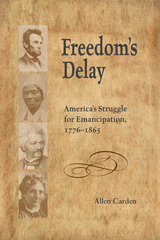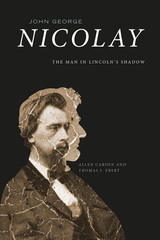2 books about Carden, Allen

Freedom’s Delay
America’s Struggle for Emancipation, 1776–1865
Allen Carden
University of Tennessee Press, 2014
The Declaration of Independence proclaimed freedom for Americans from the domination of Great Britain, yet for millions of African Americas caught up in a brutal system of racially based slavery, freedom would be denied for ninety additional years until the ratification of the Thirteenth Amendment to the U.S. Constitution. Freedom’s Delay: America’s Struggle for Emancipation, 1776–1865 probes the slow, painful, yet ultimately successful crusade to end slavery throughout the nation, North and South.
This work fills an important gap in the literature of slavery’s demise. Unlike other authors who focus largely on specific time periods or regional areas, Allen Carden presents a thematically structured national synthesis of emancipation. Freedom’s Delay offers a comprehensive and unique overview of the process of manumission commencing in 1776 when slavery was a national institution, not just the southern experience known historically by most Americans. In this volume, the entire country is examined, and major emancipatory efforts—political, literary, legal, moral, and social—made by black and white, free and enslaved individuals are documented over the years from independence through the ratification of the Thirteenth Amendment.
Freedom’s Delay dispels many of the myths about slavery and abolition, including that racial servitude was of little consequence in the North, and, where it did exist, it ended quickly and easily; that abolition was a white man’s cause and blacks were passive recipients of liberty; that the South seceded primarily to protect states’ rights, not slavery; and that the North fought the Civil War primarily to end the subjugation of African Americans. By putting these misunderstandings aside, this book reveals what actually transpired in the fight for human rights during this critical era. Carden’s inclusion of a cogent preface and epilogue assures that Freedom’s Delay will find a significant place in the literature of American slavery and freedom.
With a compelling preface and epilogue, notes, illustrations and tables, and a detailed bibliography, this volume will be of great value not only in courses on American history and African American history but also to the general reading public.
Allen Carden is professor of history at Fresno Pacific University in Fresno, California. He is the author of Puritan Christianity in America: Religion and Life in Seventeenth-Century Massachusetts.
This work fills an important gap in the literature of slavery’s demise. Unlike other authors who focus largely on specific time periods or regional areas, Allen Carden presents a thematically structured national synthesis of emancipation. Freedom’s Delay offers a comprehensive and unique overview of the process of manumission commencing in 1776 when slavery was a national institution, not just the southern experience known historically by most Americans. In this volume, the entire country is examined, and major emancipatory efforts—political, literary, legal, moral, and social—made by black and white, free and enslaved individuals are documented over the years from independence through the ratification of the Thirteenth Amendment.
Freedom’s Delay dispels many of the myths about slavery and abolition, including that racial servitude was of little consequence in the North, and, where it did exist, it ended quickly and easily; that abolition was a white man’s cause and blacks were passive recipients of liberty; that the South seceded primarily to protect states’ rights, not slavery; and that the North fought the Civil War primarily to end the subjugation of African Americans. By putting these misunderstandings aside, this book reveals what actually transpired in the fight for human rights during this critical era. Carden’s inclusion of a cogent preface and epilogue assures that Freedom’s Delay will find a significant place in the literature of American slavery and freedom.
With a compelling preface and epilogue, notes, illustrations and tables, and a detailed bibliography, this volume will be of great value not only in courses on American history and African American history but also to the general reading public.
Allen Carden is professor of history at Fresno Pacific University in Fresno, California. He is the author of Puritan Christianity in America: Religion and Life in Seventeenth-Century Massachusetts.
[more]

John George Nicolay
The Man in Lincoln's Shadow
Allen Carden
University of Tennessee Press, 2019
"John George Nicolay played a pivotal role in Abraham Lincoln’s presidency and the preservation of his legacy. Whereas Lincoln’s other secretary, John Hay, has received extensive attention, Nicolay, until now, has remained somewhat hidden. In this important work, Allen Carden and Thomas J. Ebert bring Nicolay to life and examine the role he played in Lincoln’s administration and as coauthor with Hay of a massive Lincoln biography. The result is a work that should be read by all students of Abraham Lincoln." —Louis P. Masur, Distinguished Professor of American Studies and History and author of Lincoln’s Last Speech and Lincoln’s Hundred Days
Apart from the president’s family, arguably no one was closer to Abraham Lincoln during his tenure in the White House than John George Nicolay. A German immigrant with a keen intelligence and tenacious work ethic, Nicolay (1832-1901) served as Lincoln’s personal secretary and, owing to the extraordinary challenges facing the White House, became in effect its first chief of staff. His subsequent role as lead researcher and coauthor of a monumental ten-volume biography of the sixteenth president made him the progenitor of Lincoln scholarship.This study represents the first scholarly biography of this self-effacing man so long overshadowed by Lincoln. Drawing on extensive research in the Nicolay Papers, Allen Carden and Thomas Ebert trace Nicolay’s childhood arrival in America to his involvement in journalism and state government in Illinois. Acquainted with Lincoln in Springfield, Nicolay became a trusted assistant selected by Lincoln to be his private secretary. Intensely devoted to the president, he kept the White House running smoothly and allowed Lincoln to focus on the top priorities. After Lincoln’s death, Nicolay’s greatest achievement was his co-authorship, with his White House assistant, John Hay, of the first thoroughly documented account of Lincoln’s life and administration, a work still consulted by historians.
“Nicolay,” Carden and Ebert write, “did not make Lincoln great, but he helped make it possible for Lincoln to achieve greatness.” An essential addition to Lincoln studies, this edifying volume reveals not only how Nicolay served the Great Emancipator during his administration but also how he strove to preserve and shape Lincoln’s legacy for generations to come.
[more]
READERS
Browse our collection.
PUBLISHERS
See BiblioVault's publisher services.
STUDENT SERVICES
Files for college accessibility offices.
UChicago Accessibility Resources
home | accessibility | search | about | contact us
BiblioVault ® 2001 - 2024
The University of Chicago Press









